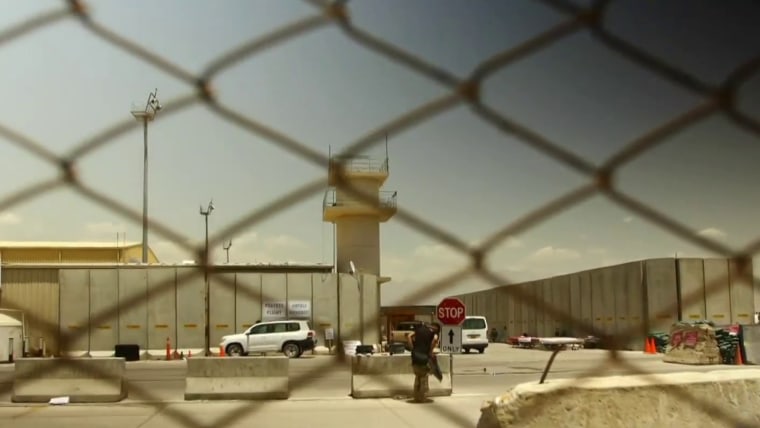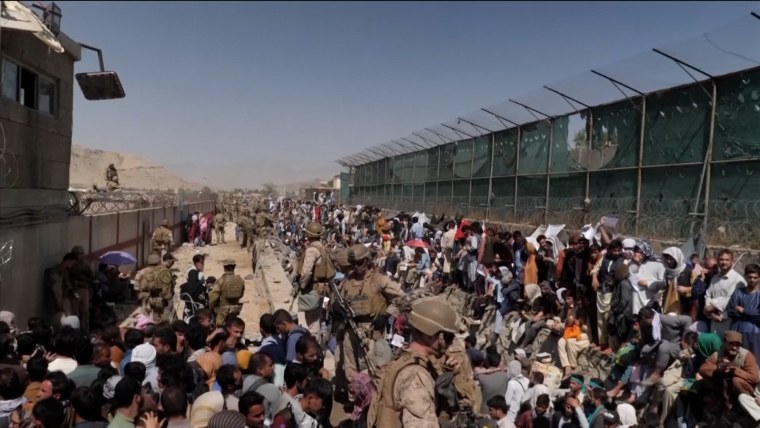[ad_1]
Many foreign workers who were hurt or killed while working for Pentagon contractors on U.S. bases in Afghanistan most likely received little or none of the financial compensation required by the U.S. government, according to a report released this week by the Costs of War Project at Brown University’s Watson Institute.
Tens of thousands of workers from Nepal, the Philippines and other developing countries took jobs at U.S. military bases in Afghanistan. At their peak in 2012, they represented more than a third of the over 100,000 contract employees, according to the report, shared exclusively with NBC News.
Called third-country nationals, or TCNs, because they were not from the U.S. or Afghanistan, they worked as cafeteria workers, janitors and often armed guards for the bases. When a car bomb or other Taliban attack occurred, Afghans and TCN contractors “were far more likely to be killed or injured,” said the report. “A U.S. military veteran … told us that Americans sometimes referred to their Nepali colleagues as ‘flak jackets’ and ‘bait’ for suicide bombers.”
During the war close to 4,000 contract workers, about half of them TCNs, died violently in Afghanistan, and thousands more suffered severe injuries, said the report.
Pentagon contractors are required by the Defense Base Act, made law in the 1940s, to buy insurance for employees to compensate them for debilitating injuries or pay their families if they are killed. But interviews with more than 200 workers suggest that payouts for those deaths and injuries didn’t happen or were inadequate, according to the report’s authors, Noah Coburn and Peter Gill.
During the interviews, Coburn and Gill found 12 different contract workers injured or killed who did not appear to have received proper compensation.
“The U.S. has depended on third-country nationals like Nepalis for their bases. They are cheaper,” said Gill. “One of the few protections they have is the Defense Base Act for insurance, and even that is not working.”
Goma Bahadur of Nepal lost her husband, Yam, a contract worker, in a suicide bombing attack at a U.S. compound on the outskirts of Kabul in 2012, where he was working security. Bahadur is entitled to roughly $250,000 in insurance payouts, per DBA rules, but had gotten only $48,000.
Since learning she had been shortchanged, Bahadur has sought legal help and is now asking a Department of Labor special court for fuller compensation.
Relevant data to determine the scope of the problem is scarce, the report found. Contractors are given millions by the government to pay the cost of worker insurance, but the companies are not required to report whether they have bought such insurance, and few opted for voluntary disclosure.
But the payout information that the authors were able to obtain via Freedom of Information Act requests showed that TCNs, despite the high risk of injury in their jobs, filed claims, and were paid, less than half as often as Americans.
When contractors are found to have violated insurance requirements, there is little punishment, according to the report.
The researchers found some Pentagon contractors did not tell injured workers that they could get compensated for severe injuries, or, when workers died, did not tell surviving family members that they were entitled to compensation.
At least six times, the researchers found, the Department of Labor found that U.S. contractors in Afghanistan failed to file insurance claims for injured workers, but the fines for all six offenses totaled $3,250. Four other companies lost their Pentagon contracts for not having proper insurance.
“You just don’t have nefarious companies,” Coburn said. “You also have a government that allows these practices to continue.”
Some TCNs or their survivors have sought redress in U.S. courts, note the authors, another sign that the problem is more widespread than available data can show. They cite the work of Matthew Handley, a Washington attorney who has worked on roughly 50 cases of workers seeking fuller compensation, mostly Nepalis.
Foreign workers are shortchanged most often, Handley told NBC News. “The laws that are supposed to compensate workers have overwhelmingly benefited Americans as opposed to third-country nationals,” he said.
The Labor Department declined to comment on the report without seeing it.
In a statement, a Defense Department spokesperson said, “The Department of Defense is not aware of the cited study nor any specific cases of Defense Base Act (DBA) noncompliance,” and said the rules are “very clear when overseas workers’ compensation and war-hazard insurance is required.”
NBC News previously reported on abuse and neglect of foreign employees on U.S. military bases abroad in partnership with the International Consortium of Investigative Journalists, The Washington Post, and Arab Reporters for Investigative Journalism. Foreign nationals were found to have been paid less than promised, charged recruiting fees that leave them deep in debt, and pressured to sign improper contracts and work long hours, according to interviews and government reports. In some cases, they faced physical abuse.
 Latest Breaking News Online News Portal
Latest Breaking News Online News Portal







